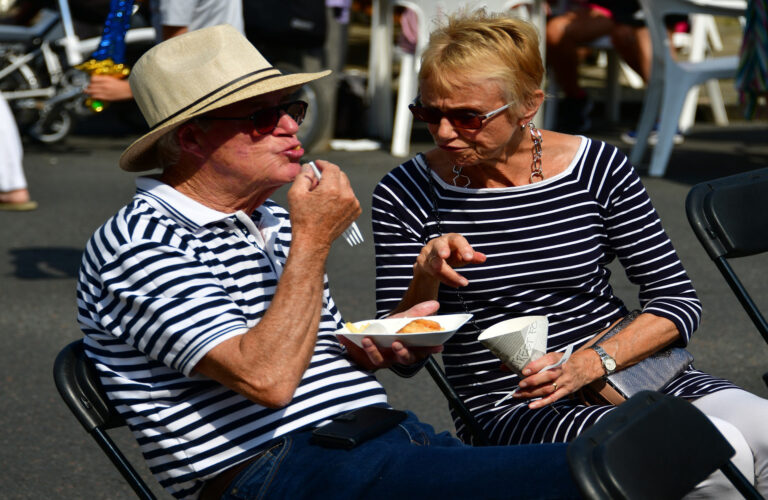“A balanced diet is a cookie in each hand.” –Barbara Johnson
Okay, yes, that quote is a “bit” tongue-in-cheek. But it points at the obvious.
Having a balanced diet is important, whether seniors live on their own or in assisted living.
So what could be stopping Grandma and Grandpa from eating well?
If you’ve set your table carefully and looked for ways to prevent choking, you may need to check out one more potential hazard.
The food itself: before, during, and after the meal.
Before: Checking for Malnutrition
“You are what you eat. So don’t be fast, cheap, easy, or fake.”
Healthy eating takes effort for all of us. But grandparents may have extra struggles. So the real question is, what’s in their cupboards?
1. Are They Eating the Wrong Foods?
Keep your friends close, your enemies closer, and the junk food as far away as possible.”
Now and then, potato chips or brownies are fine. But they shouldn’t be standard plate attire.
- Foods high in salt (sodium) can raise blood pressure and cause swelling in the arms and legs, increasing the chance of falls.
- Foods high in sugar can send heart rate and blood sugar on a roller coaster, triggering dizziness and, yep, falls.
- Fatty foods can affect bowels, meaning bloating and diarrhea.
One of the problems? Junk food is cheaper. So if your grandparents are on a fixed income, they may be getting by with what they can afford.
If you notice a stockpile of unhealthy foods, ask them about it. A treat now and then is fine. A steady diet of it will cause problems sooner than they’ll like.
2. Are They Not Eating the Right Foods?
“Never eat ingredients you can’t pronounce. Except quinoa. You should eat quinoa.”
Healthy eating requires planning—and often more frequent trips to the store to keep it fresh.
- Look for a variety of fruits and vegetables — think of the rainbow. Different colors tend to give different nutrients.
- If they’re on antibiotics, pick up yogurt with probiotics. (For women, it prevents yeast infections. For women and men, it can stop diarrhea.)
- Balance carbs, proteins, and fats. Remember, everything in moderation.
Again, more shopping can mean more cost. And if your grandparents don’t have a car readily available, it’s doubly hard.
But remember that healthy eating is cheaper — and takes less time — than doctor visits.
If you live nearby, plan an outing at least once a week where you can enjoy some time together planning and shopping.
If you don’t live close, arrange for a college student to shop for them.
3. Are They Eating at All?
“There are some days I forget to eat the entire day, and then there are other days where I have first breakfast, second breakfast, elevenses, luncheon, …”
We all have moments when we’re so busy we don’t stop to eat — or we just graze all day. But for Grandma and Grandpa, is it more than once in a while?
- Is there rotting food in the fridge?
- Are they suddenly losing weight?
- Or the opposite—Are they gaining?
Forgetting to eat or forgetting they already ate could be a sign that they’re lonely or anxious, struggling with depression or dementia.
Talk with them. Ask questions. Listen to them. If necessary, get their doctor involved.
They might just need someone to check in on them regularly
Together, you could create a written menu. Or make food for the week, filling reheatable containers, labeled by day and meal.
4. Too Much, Margaret?
“How Do You Eat an Elephant? One Bite at a Time.”
Their not-eating may be more physical than emotional.
- If they’re overwhelmed with multiple things on their plate, make it a three-course meal. First salad, then meat, then potatoes.
- Their mouth might be too dry to swallow. Check to see if they’re drinking enough, especially if one of their medications causes excessive dry mouth.
- If they’re struggling with dementia, they may forget how to chew or swallow. Gently remind them with simple instructions and serve softer foods that slide down easily.
- If they’re struggling to feed themselves and even finger foods are hard, offer to help. Make the experience as dignified as possible. If food dribbles down from their mouths, just gently wipe it up.
5. No More Energizer Bunny?
“Who knew that the hardest part about being an adult is figuring out what to cook for dinner every single night for the rest of your life?”
Are they just too tired to cook?
- Again, planning and preparing weekly meals together on the weekends is a great option.
- A liquid well-balanced supplement like Ensure can make sure they’re catching important vitamins for snacks or small meals when they can’t fill a full plate.
- An adult daycare program may include meals for one or more days a week.
- And if they can’t leave their home or assisted living center, their local Meals on Wheels program may provide hot meals right to their door — along with some friendly conversation.
Surprisingly, though, sometimes the best way to get energy is to expend it.
Take a walk with them outside. The fresh air and exercise will give them some oomph AND increase their appetite.
Definitely a win/win situation.
6. Table Too Empty?
“Food is maybe the only universal thing that has the power to bring everyone together. No matter what culture, everywhere around the world, people eat together.” –Guy Fieri
There’s just something about conversation that can make the simplest food taste better, while a lonely kitchen can turn the best recipe into dust. Dining together is one of the great activities for seniors that helps them stay social.
If they’re used to having a table full of people, making a full meal may feel silly. Next thing you know, they just graze on whatever they can find — meaning too much or too little.
- If you can’t stop by for a meal regularly throughout the week, again, hire a college student to come by for meals here and there.
- OR ask a mom of young kids if she would like to bring them by for a lunch date, helping both her and your grandparents. She gets something to do with her toddlers — who may be climbing the walls at home — and that incredibly contagious childhood laughter fills your grandparents’ rooms once more.
- It may be time to consider a senior living community like Frontida Assisted Living where meals are eaten and enjoyed together.
On the other hand, sometimes, company can actually be too distracting.
If you find Grandma and Grandpa eating less with company,
- Try calming things down, going back to one or two at the table.
- Turn on soft music.
- Turn off the television.
- Let the focus be on their food.
Whether they want company or don’t want it may differ from day-to-day. If they’ve had a lot of it, they may need some downtime. If they’ve been cooped up with little interaction, they may need other faces and voices.
Again talk to them. Listen.
Gauge how they’re feeling and offer what support they need to make meals nutritious and enjoyable.
During: Testing Thermostat Issues
“Why is chili called “chili” when it’s really hot?”
As we get older, our mouths may not recognize the temperature of food as quickly.
Meaning if food is too hot, Grandma and Grandpa could get burned. Badly.
- If you use the microwave to reheat food, stir before serving so there aren’t unexpected hot spots in the mix.
- Test hot liquids like coffee, tea, and soup to be sure they aren’t scalding.
- Be careful with hot “drippy” foods. Like those melted cheese and turkey sausages. Believe me — if it’s right out of the oven, it only takes a second on the lips to take skin right off. (Yes, sadly I know from personal experience!)
- Again, consider Frontida Assisted Living Facilities where the talented chefs can make sure food temp is safe.
Don’t let a fun night of pizza or some other tasty goodness turn into burning pain. Food thermometers are cheap and easy to use.
After: Does What Happens at Dinner Stay There?
“It is difficult to think anything but pleasant thoughts while eating a homegrown tomato.” –Lewis Grizzard
Lots of foods taste yummy at the dinner table. Only to make themselves known for the rest of the night.
- Maybe they cause heartburn.
- Maybe the problems are lower— and especially hard to deal with if getting to the bathroom is difficult.
- Or maybe the food cross contaminates with medications — either nixing benefits or uber-intensifying the result.
Keep written track of rough nights and what was eaten the day (and sometimes days) before.
Hopefully, you’ll quickly see connections to what’s not going down so well. But, if not, your written notes could be helpful when talking to your grandparents’ doctors.
To Eat or Not to Eat
Healthy safe eating is important. It nourishes minds, bodies, and—when done with a community—the soul. So set the dining ambiance, help them avoid choking, and stock their fridge shelves with nutritious delights. Or find a safe assisted living facility like Frontida where all of that will be taken care of for them.
Enjoy your loved ones for who they are. No matter what their age, they still have hopes and dreams. And they need friends, family, and fun as much as they need food.
In the end, help them live as physician Michelle May suggests:
“When I’m hungry, I eat what I love. When I’m bored, I do something I love. When I’m lonely, I connect with someone I love. When I feel sad, I remember that I am loved.”
Check out these other helpful posts to learn more about eating and dietary issues for grandparents.

Elizabeth Daghfal is a writer, teacher, speaker, and community volunteer. When she isn't teaching or writing-- Who are we kidding? Her husband and five kids say she's ALWAYS teaching and writing. She has a passion to help people who are struggling and is happy to say her shoulders are drip-dry. Born and raised in the South, she now lives in Wisconsin and loves it--except for the fifteen months of winter. Read more about her at elizabethdaghfal.com.

